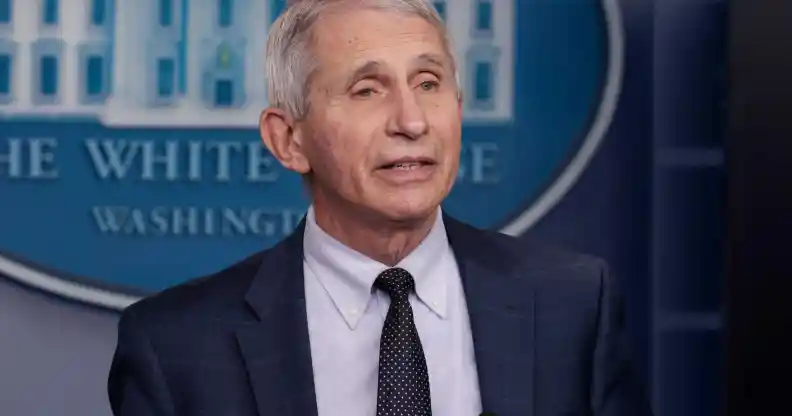Tributes pour in for HIV trailblazer Dr Anthony Fauci as he announces retirement

Dr Anthony Fauci. (Getty/Anna Moneymaker)
Dr Anthony Fauci, who played a key role in steering the US through the AIDS crisis and COVID-19 pandemic, will be stepping down from his government roles in December.
Fauci announced he will be leaving his roles as director of the National Institute of Allergy and Infectious Diseases (NIAID) and as the White House’s chief medical adviser at the end of this year to “pursue the next chapter of [his] career”.
“While I am moving on from my current positions, I am not retiring,” Fauci said. “After more than 50 years of government service, I plan to pursue the next phase of my career while I still have so much energy and passion for my field.”
He continued: “I want to use what I have learned as NIAID director to continue to advance science and public health and to inspire and mentor the next generation of scientific leaders as they help prepare the world to face future infectious disease threats.”
The 81-year-old didn’t specify what this next phase of his career would include. He mentioned in July that he planned to step down from the government by the end of president Joe Biden’s term in January 2025.
Anthony Fauci served as the head of NIAID for 38 years and was the face of the US response to the COVID-19 pandemic as the chief medical adviser to the Biden administration.

Dr Anthony Fauci, director of the NIAID and the chief medical advisor to White House, led the US response to the COVID-19 pandemic. (Getty/Anna Moneymaker)
Biden thanked Fauci for his “unwavering” commitment, “unparalleled spirit, energy and scientific integrity”.
The president described Fauci as a “dedicated public servant” who has been at the “forefront of some of [the US’s] most dangerous and challenging public health crises”.
“As he leaves his position in the US government, I know the American people and the entire world will continue to benefit from Dr Fauci’s expertise in whatever he does next,” Biden said. “Whether you’ve met him personally or not, he has touched all Americans’ lives with his work.”
Department of Health and Human Services secretary Xavier Becerra praised Fauci for his “decades of public service that have undoubtedly improved the health of millions of people globally”.
“When I arrived at HHS, the world was one year into the COVID-19 pandemic,” Becerra said. “I quickly came to rely on Dr Fauci’s wisdom and counsel in our response, and along with his scientific acumen, I treasure his ability to break down complex science in simple terms to the American people to save lives.”
Becerra added that Fauci’s “selfless passion” brought “hope and healing to people fighting for their health” during the AIDS crisis and into the modern day.
“Dr Fauci’s pioneering approach to tackle public health decades ago included a critical role in our nation’s domestic and international response to HIV/AIDS, ultimately helping create the President’s Emergency Plan for AIDS Relief,” Becerra said.
Fauci first joined the National Institutes of Health in 1968 under the presidency of Lyndon Johnson. He was later appointed the director of NIAID in 1984 at the height of the AIDS epidemic in the US.
Fauci was also involved as an HIV and AIDS researcher since the virus was recognised in 1981.
He described in June how his extensive work during the AIDS crisis in the 80s strengthened his core belief that health experts must work directly with the LGBTQ+ community and other marginalised groups in the US in response to the current monkeypox outbreak.
“Had the world understood that in the very early years of HIV, I think there would have been a lot more information exchanged in a way that is productive, and that could have saved lives… the lessons we learned from HIV helped us with COVID, and the lessons we learned from HIV are helping us with monkeypox,” Fauci said.

Dr Anthony Fauci advocated for health officials to work closely with the LGBTQ+ community and marginalised groups as part of the US’s response to monkeypox. (Getty/Al Drago-Pool)
Peter Staley – a founding member of Act Up New York, a prominent AIDS activist group – told NPR that Fauci was “one of the few” powerful people in Washington DC that “opened his doors early” to “listen and to hear” the voices of the LGBTQ+ community in the 80s.
“And he was one of the few that wasn’t afraid of us, and thought we had something to bring to the table,” Staley said.
Staley recalled how Fauci held dinners at the home of a gay man, who worked in his office, and these dicussions would “last for many hours”. The activist said the pair didn’t always agree, but Staley “came to respect the man intensely during that period”.
Fauci served under seven presidents throughout his career and has led the charge on newly emerging or re-emerging infectious disease threats in the US. This included West Nile virus, anthrax attacks, pandemic influenza, various bird influenza threats, Ebola and Zika.
It wasn’t until 2020 – at the onset of the ongoing COVID-19 pandemic – that he stepped into the limelight as the US’s top infectious disease expert. Fauci frequently appeared in media reports in the US and abroad as he detailed the nation’s battle with coronavirus.
Anthony Fauci said it was the “honour of a lifetime” to have led the NIAID for so long and through “so many scientific and public health challenges”.
He has not given a definitive date for his departure. Fauci said he will put his “full effort, passion and commitment” into his current role over the coming months and will help prepare NIAID for a leadership change in December.

